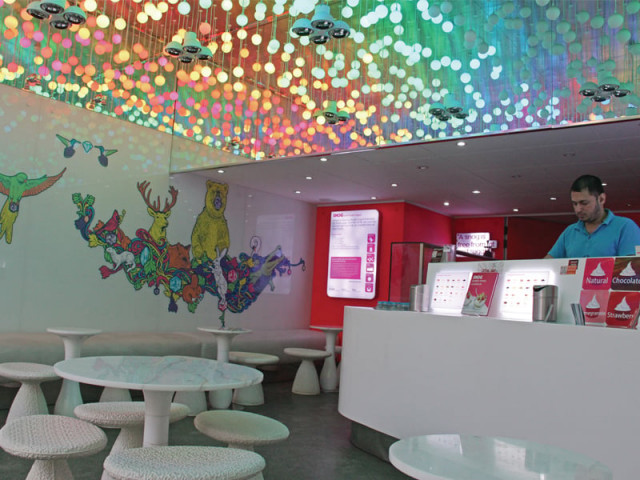Fun food: Business of frozen yogurt going cold?
Lack of proper marketing and branding hurting several new outlets.

The fro-yo business has slowed down amid a presence of several outlets within very little time. PHOTOS: AYESHA MIR/EXPRESS
Higher prices, the law of supply says, tend to increase the quantity supplied of a good or service, assuming nothing else changes.
Perhaps, this basic economics concept best defines local investors’ approach towards the frozen yogurt business that has slowed down in the country after a brief flirtation with success.
Frozen yogurt or fro-yo was originally introduced as a low-fat alternate to ice cream and sold as a health food in the western world. With more people switching to fro-yo, this niche product started competing with the conventional frozen dessert like ice cream.

The fro-yo business has slowed down amid a presence of several outlets within very little time. PHOTOS: AYESHA MIR/EXPRESS
Still a fresh concept in Pakistan, fro-yo received an overwhelming response. As a result, several new players entered the market – thinking there was a growing demand for the product. By 2013, America’s Tutti Frutti, Berrylicious and The Country’s Best Yogurt (TCBC); UK’s Snog; Canada’s Yogen Früz and South Korea’s Red Mango each had their franchises running in the country.
Despite this influx of international chains, fro-yo business failed to create a mass appeal. According to market sources, nearly a dozen outlets from various brands have already wrapped up their operations in Karachi, Lahore and Islamabad – some within six months of their launch.
There was a hype that the market was ready for fro-yo business but the reality was different, according to sources. “It’s a niche product that appeals to health-conscious consumers. The concept doesn’t really work in Pakistan,” said the industry source.
The investors’ optimism about the Pakistani market – the sixth largest consumer base in the world – was partly driven by an overall demand for food business. According to a conservative study by online food portal EatOye, Pakistanis spend close to a billion dollar on food every year — such is the potential for food business.
However, the investors misread the market in the case of fro-yo, experts say, as supply clearly exceeded demand.
“The rapid expansion of fro-yo chains is the primary reason why this business is struggling generally,” said an industry expert doing business with fro-yo chains as well as other food restaurants mostly in the upscale areas of Karachi, Lahore and Islamabad.

“There were only one to two players in the market in 2012 but within the next year or so as many as half a dozen new chains entered the country,” the expert said. “The demand is growing slowly. The problem was that people misread the market, which may just be good for three to four players at the moment.”
“It’s true that there are many players in the market but there are a host of other reasons why the concept has not taken off as per expectations,” said Shamsi Khan Shamsi, a representative of Yogen Früz franchises that entered Pakistani market in November, 2012.
The Canadian fro-yo chain expanded aggressively by opening franchises in Karachi, Lahore and Islamabad. However, all of its Karachi franchises – three in total – were closed down recently. It also closed one of its franchises in Islamabad.
Explaining, Shamsi said some franchisees didn’t have a background in this business. “One has to be patient as every new business takes a while to click.”
At the time of the launch, the company conducted branding and marketing at a national level but a lot more was needed to be done by franchisees, Shamsi said.
“Maybe, they thought the business would click on the brand’s strength alone,” he said. For example, he said their Zamzama franchise closed down despite being at a prime location.
Shamsi’s observation was seconded by an industry expert who has more than 10 years of experience in the food and restaurant business — both in Pakistan and abroad. “Many people jumped in this business because of its high profitability margin but they failed to conduct proper marketing and branding,” the expert said.
However, Yogen Früz is not the only brand reflecting the trend. Tutti Frutti also closed about half a dozen outlets, while Berrylicious also closed at least one.
“One common mistake was not to choose a suitable location,” said Umar Hussain, who sold a Tutti Frutti franchise at Zamzama. Food business is a different ball game, he said, some businesses run well in malls, while others do well on roadside locationS – Tutti Frutti’s Clifton outlet closed but the one in Dolmen City Mall is still running.
Though the general trend does not seem to favour the fro-yo business, there are signs that the concept will click.
“It’s too early to say how the market is doing but the response so far is very positive despite the fact that our product is expensive,” said Taimur Butt of Red Mango, which entered the market only three months ago.
“We are attracting high traffic on both outlets at Zamzama and Nueplex,” he said. “Our expectations are that it will do much better going forward and we are planning to launch one in Islamabad and a few more in Karachi.”
Published in The Express Tribune, February 3rd, 2014.
Like Business on Facebook, follow @TribuneBiz on Twitter to stay informed and join in the conversation.



















COMMENTS
Comments are moderated and generally will be posted if they are on-topic and not abusive.
For more information, please see our Comments FAQ